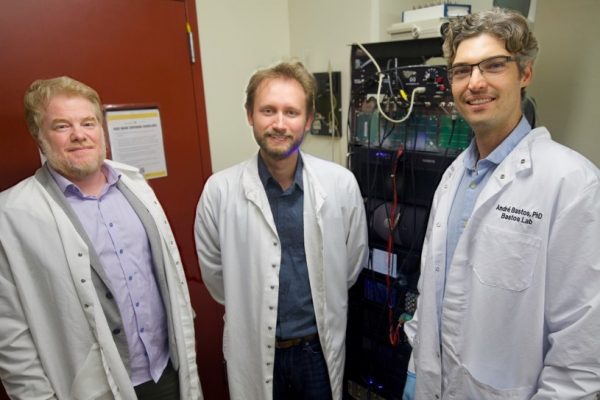https://www.youtube.com/check out?v=_h2UcEWZ4Jk
A staff comprising Assistant Professor of Psychology André Bastos, Associate Professor of Psychology and Affiliate Professor of Ophthalmology and Visual Sciences Alexander Maier and Ph.D. prospect Jacob A. Westerberg is among the three intercontinental exploration groups that have received the chance to go after their exploration of mind purpose at the Allen Mind Observatory.
Bastos, Maier and Westerberg’s undertaking will discover theories all-around predictive coding, or mind electricity conservation. Predictive coding allows the brain to conserve strength when an atmosphere fulfills the brain’s expectations so that it can alternatively concentration on the worthwhile or perilous outcomes of unexpected eventualities. The workforce is checking out predictive coding by measuring neural exercise with neuropixel probes that can file 1000’s of neurons at the same time. The workforce will evaluate the activity in brain locations uncovered to envisioned or surprising illustrations or photos to see precisely which neurons conserve their electrical power. In addition, a technique known as optogenetics will determine the unique sort of inhibitory neurons that are activated through processing of predicted visuals.
“The notion driving predictive coding is that the brain actively subtracts away the portion of the neuronal response that is totally anticipated,” claimed Bastos, who has a longstanding interest in the neuronal circuits that apply prediction. “This enables us to commit sources to surprising inputs. We hypothesize that this ‘active subtraction’ is achieved by selective activation of inhibitory interneurons. This collaboration with the Allen Institute is furnishing us with the slicing-edge tools to ultimately deal with this concern.”

“To me, this product looks to be the long term. The knowledge assortment aspect can really only be performed by the Allen Institute,” Maier mentioned in a launch. “To open up this source to investigators like us who do not have that obtainable, and then to split the perform in phrases of who collects the data and who analyzes the knowledge, that to me would seem like a quantum leap.”
The observatory is facilitated by the Allen Institute’s OpenScope initiative. Identical to the way astronomers from about the world convene at just a number of observatories housing subtle and highly-priced equipment to examine the universe, the Allen Brain Observatory will allow neuroscientists to propose and direct theoretical, computational and experimental science executed on 1 of the institute’s significant-throughput experimental platforms. All investigate developed at the observatory is built freely readily available to any one tackling open concerns in neural action in health and sickness.
“In the era of huge neuroscience details, strategies to collect that details are becoming far more sophisticated—and a lot more intricate and high priced. A neighborhood platform like OpenScope can aid democratize some aspects of this sort of science, providing entry to researchers who might not have the resources or time to conduct this kind of massive-scale experiments in-dwelling,” claimed Jérôme Lecoq, associate investigator at the Allen Institute and head of the OpenScope application, which is section of the institute’s MindScope method.
The other two teams chosen are led by researchers from the College of California, Berkeley and York and McGill Universities in Canada. These teams are looking into what illusions can teach us about the mind and how neurons integrate sudden alerts.
About MindScope
The MindScope plan at the Allen Institute, which incorporates OpenScope, seeks to understand the transformations, occasionally termed computations, in coding and decoding that direct from photons to behavior and acutely aware experience by observing, perturbing and modeling the physical transformations of alerts in the cortical-thalamic visual program inside of a couple perception-action cycles. The system generates facts and discoveries by means of the Allen Mind Observatory, a standardized and high-throughput experimental platform that captures neurons and circuits in action in the visual locations of the mouse mind, to glean rules of how the mammalian brain procedures data, responds to the exterior planet and drives conduct.
About the Allen Institute
The Allen Institute is devoted to answering some of the largest inquiries in bioscience and accelerating analysis around the world. The institute is a acknowledged chief in large-scale analysis with a motivation to an open science design. Its investigate institutes and programs consist of the Allen Institute for Brain Science, launched in 2003, the Allen Institute for Cell Science, released in 2014, the Paul G. Allen Frontiers Group, released in 2016, the Allen Institute for Immunology, launched in 2018, the MindScope Method, released in 2020 and the Allen Institute for Neural Dynamics, launched in 2021.
